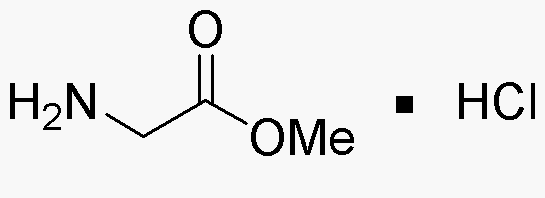Glycine methyl ester hydrochloride is widely utilized in research focused on:
- Pharmaceutical Development: This compound serves as an intermediate in the synthesis of various pharmaceuticals, particularly in the development of drugs targeting the central nervous system.
- Biochemical Research: It is used in the study of amino acid metabolism and protein synthesis, providing insights into cellular functions and disease mechanisms.
- Peptide Synthesis: Glycine methyl ester hydrochloride is a key reagent in the solid-phase peptide synthesis process, enabling the creation of complex peptides for therapeutic applications.
- Food Industry: It finds applications as a flavor enhancer and nutritional supplement, contributing to the formulation of protein-rich food products.
- Cosmetic Formulations: The compound is incorporated into skincare products for its moisturizing properties, enhancing the texture and efficacy of creams and lotions.
Información general
Propiedades
Seguridad y normativas
Aplicaciones
Glycine methyl ester hydrochloride is widely utilized in research focused on:
- Pharmaceutical Development: This compound serves as an intermediate in the synthesis of various pharmaceuticals, particularly in the development of drugs targeting the central nervous system.
- Biochemical Research: It is used in the study of amino acid metabolism and protein synthesis, providing insights into cellular functions and disease mechanisms.
- Peptide Synthesis: Glycine methyl ester hydrochloride is a key reagent in the solid-phase peptide synthesis process, enabling the creation of complex peptides for therapeutic applications.
- Food Industry: It finds applications as a flavor enhancer and nutritional supplement, contributing to the formulation of protein-rich food products.
- Cosmetic Formulations: The compound is incorporated into skincare products for its moisturizing properties, enhancing the texture and efficacy of creams and lotions.
Documentos
Hojas de datos de seguridad (HDS)
La SDS proporciona información de seguridad completa sobre la manipulación, el almacenamiento y la eliminación del producto.
Especificación del producto (PS)
La PS proporciona un desglose completo de las propiedades del producto, incluida la composición química, el estado físico, la pureza y los requisitos de almacenamiento. También detalla los rangos de calidad aceptables y las aplicaciones previstas del producto.
Certificados de análisis (COA)
Busque certificados de análisis (COA) ingresando el número de lote del producto. Los números de lote y de partida se pueden encontrar en la etiqueta de un producto después de las palabras "Lote" o "Lote".
Número de catálogo
Número de lote/lote
Certificados de origen (COO)
Este certificado de origen confirma el país en el que se fabricó el producto y también detalla los materiales y componentes utilizados en él y si se deriva de fuentes naturales, sintéticas u otras fuentes específicas. Este certificado puede ser necesario para cumplir con las normativas aduaneras, comerciales y regulatorias.
Número de catálogo
Número de lote/lote
Hojas de datos de seguridad (HDS)
La SDS proporciona información de seguridad completa sobre la manipulación, el almacenamiento y la eliminación del producto.
DownloadEspecificación del producto (PS)
La PS proporciona un desglose completo de las propiedades del producto, incluida la composición química, el estado físico, la pureza y los requisitos de almacenamiento. También detalla los rangos de calidad aceptables y las aplicaciones previstas del producto.
DownloadCertificados de análisis (COA)
Busque certificados de análisis (COA) ingresando el número de lote del producto. Los números de lote y de partida se pueden encontrar en la etiqueta de un producto después de las palabras "Lote" o "Lote".
Número de catálogo
Número de lote/lote
Certificados de origen (COO)
Este certificado de origen confirma el país en el que se fabricó el producto y también detalla los materiales y componentes utilizados en él y si se deriva de fuentes naturales, sintéticas u otras fuentes específicas. Este certificado puede ser necesario para cumplir con las normativas aduaneras, comerciales y regulatorias.

